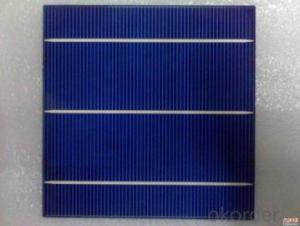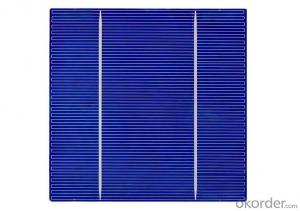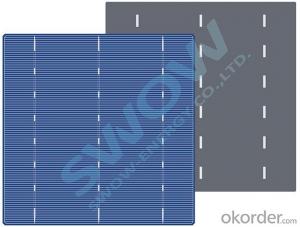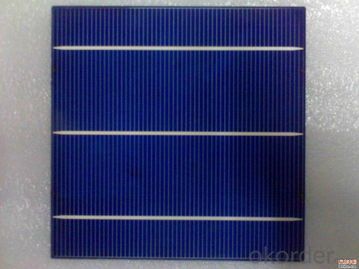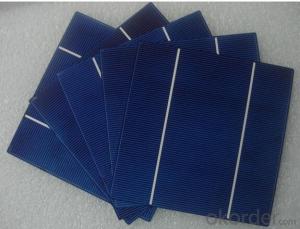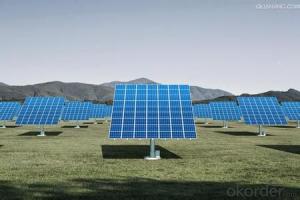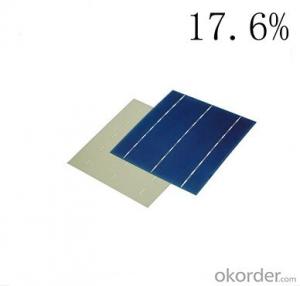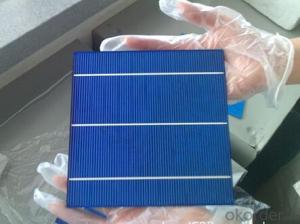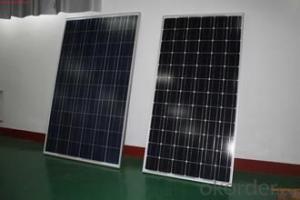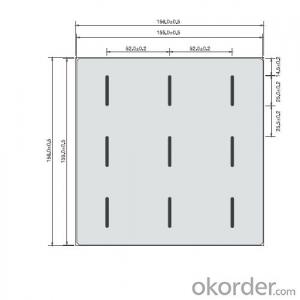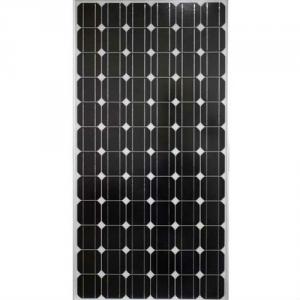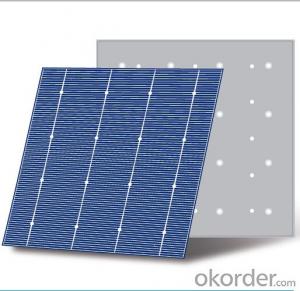Pecvd Poly-Crystalline Silicon Solar Cells
- Loading Port:
- Shanghai
- Payment Terms:
- TT OR LC
- Min Order Qty:
- -
- Supply Capability:
- 5MW pc/month
OKorder Service Pledge
Quality Product, Order Online Tracking, Timely Delivery
OKorder Financial Service
Credit Rating, Credit Services, Credit Purchasing
You Might Also Like
3BB Poly-Crystalline Silicon Solar Cells
futures
• Format: 156 x 156mm ±0.5mm
• Thickness: 210 ± 30μm
• Front (-): 1.4mm bus bars (silver),blue anti-reflecting coating (silicon nitride)
• Back (+): 2.0mm wide soldering pads (silver) back surface field (aluminum)
| No. | Efficiency [ % ] | PMPP [ Wp ] | VMPP [ V ] | IMPP [ A ] | VOC [ V ] | ISC [ A ] | FF [ % ] |
| 12 | 17.90–18.00 | 4.36 | 0.53 | 8.16 | 0.64 | 8.7 | 78.86 |
| 11 | 17.80–17.90 | 4.33 | 0.53 | 8.13 | 0.63 | 8.67 | 78.77 |
| 10 | 17.70–17.80 | 4.31 | 0.53 | 8.11 | 0.63 | 8.64 | 78.69 |
| 9 | 17.60–17.70 | 4.29 | 0.53 | 8.09 | 0.63 | 8.63 | 78.6 |
| 8 | 17.50–17.60 | 4.26 | 0.53 | 8.07 | 0.63 | 8.6 | 78.5 |
| 7 | 17.40–17.50 | 4.24 | 0.53 | 8.05 | 0.63 | 8.59 | 78.41 |
| 6 | 17.30–17.40 | 4.21 | 0.52 | 8.03 | 0.63 | 8.57 | 78.35 |
| 5 | 17.20–17.30 | 4.19 | 0.52 | 8.01 | 0.63 | 8.55 | 78.29 |
| 4 | 17.10–17.20 | 4.16 | 0.52 | 7.99 | 0.62 | 8.53 | 78.23 |
| 3 | 17.00–17.10 | 4.14 | 0.52 | 7.96 | 0.62 | 8.5 | 78.22 |
| 2 | 16.80–17.00 | 4.09 | 0.52 | 7.89 | 0.62 | 8.46 | 77.76 |
| 1 | 16.60–16.80 | 4.04 | 0.52 | 7.83 | 0.62 | 8.45 | 76.78 |
- Q: Have you ever been to a solar cell power generation station?
- No, but I saw it on TV.
- Q: What is the cost of solar cells?
- The cost of solar cells varies depending on a variety of factors such as the type and size of the solar cell, installation costs, and government incentives. On average, the cost can range from $0.30 to $0.60 per watt for residential solar cells and can be higher for commercial or utility-scale installations. It's important to consider the long-term benefits and savings that solar cells provide, making them a cost-effective investment in renewable energy.
- Q: What are the environmental impacts of solar cell production?
- The production of solar cells does have some environmental impacts, but they are generally considered to be relatively low compared to other forms of energy production. Some key impacts include the extraction and processing of raw materials, such as silicon and metals, which can result in habitat destruction and water pollution. Additionally, the manufacturing process itself requires energy and water, which can contribute to greenhouse gas emissions and water scarcity. However, when considering the overall life cycle of solar cells, including their use and end-of-life disposal, they still have a significantly lower carbon footprint and environmental impact compared to fossil fuel-based energy sources.
- Q: Can solar cells be used for powering oil rigs?
- Yes, solar cells can be used for powering oil rigs. Solar panels can harness sunlight to generate electricity, which can be utilized to power various equipment and systems on oil rigs, reducing reliance on traditional fossil fuel-based generators and minimizing environmental impact. However, the feasibility and effectiveness of implementing solar power on oil rigs depend on factors such as energy requirements, geographic location, available space, and cost considerations.
- Q: Can solar cells be installed on any type of roof?
- Solar cells can be installed on most types of roofs, including flat, sloped, and even curved roofs. However, the feasibility and efficiency of installation may vary depending on factors such as roof orientation, shading, structural integrity, and local regulations. It is advisable to consult with a professional solar installer to determine the suitability of your specific roof for solar panel installation.
- Q: Can solar cells be used in powering medical devices?
- Yes, solar cells can be used to power medical devices. Solar cells convert sunlight into electricity, which can be stored in batteries and used to power various medical devices such as portable health monitors, defibrillators, or even prosthetic limbs. This can be especially useful in remote areas or during emergencies where access to a reliable power source may be limited.
- Q: How do solar cells handle temperature fluctuations?
- Solar cells generally handle temperature fluctuations well, but extreme temperatures can have an impact on their performance. In cold temperatures, solar cells tend to have slightly higher efficiency, meaning they can produce more electricity. However, excessive heat can cause a decrease in efficiency and even damage to the cells. To counteract this, solar panels are designed to dissipate heat effectively and are often installed with a gap between the panels and the roof to allow for better airflow. Additionally, some solar cell technologies, such as thin-film solar cells, are less susceptible to temperature variations compared to traditional crystalline silicon cells. Overall, while solar cells can tolerate temperature fluctuations, it is crucial to consider and manage heat buildup to ensure optimal performance and longevity.
- Q: How do solar cells handle power quality issues?
- Solar cells do not directly handle power quality issues. However, inverters, which are an integral part of solar power systems, help mitigate power quality issues. Inverters convert the direct current (DC) produced by solar cells into alternating current (AC) that is suitable for use in electrical systems. Modern inverters include features such as voltage regulation, frequency control, and power factor correction, which help maintain power quality within acceptable limits. Additionally, grid-tied solar systems often rely on the electrical grid to balance power quality issues, as excess solar electricity can be fed back into the grid or drawn from it when needed.
- Q: Can solar cells be used for wireless communication devices?
- Yes, solar cells can be used for wireless communication devices. Solar cells convert sunlight into electrical energy, which can power various devices including wireless communication devices such as smartphones, tablets, or even Wi-Fi routers. This enables the devices to operate without relying on traditional power sources, making them more flexible and sustainable.
- Q: Can solar cells be used in space exploration?
- Yes, solar cells can be used in space exploration. Solar cells are commonly utilized in space missions to generate electrical power from sunlight, as they are an efficient and reliable source of energy in the vacuum environment of space. They have been employed in various spacecraft and satellites to power systems and instruments, including communication devices, scientific instruments, and propulsion systems. Solar cells are essential for prolonged missions in space, as they provide a sustainable and renewable source of energy.
Send your message to us
Pecvd Poly-Crystalline Silicon Solar Cells
- Loading Port:
- Shanghai
- Payment Terms:
- TT OR LC
- Min Order Qty:
- -
- Supply Capability:
- 5MW pc/month
OKorder Service Pledge
Quality Product, Order Online Tracking, Timely Delivery
OKorder Financial Service
Credit Rating, Credit Services, Credit Purchasing
Similar products
Hot products
Hot Searches
Related keywords
